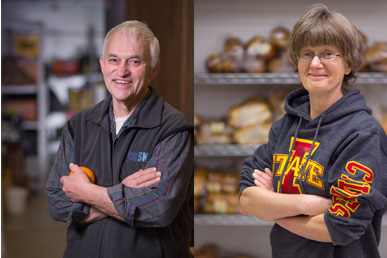
Gleaning Food Waste to Curb Hunger
Every Tuesday night Carol Cornelious, a seed analyst in agronomy, shows up at the local Panera restaurant after it has closed.
She is gleaning for Food at First, a perishable food pantry and free meal program in Ames. Cornelious collects food Panera is donating to the effort, which is now in its 12th year.
She has been involved for about four years, working about 15 hours a week. Cornelious wanted to do something for the community and a friend mentioned it. After starting, she stepped in when a core market volunteer left.
“I tell people, ‘It’s addictive for me. I just can’t stop and when I don’t go, I feel bad,’ ” Cornelious says.
Food at First gleaners are dealing with the parallel problems of hunger and food waste in Story County. Many are current and past Iowa State University faculty, staff and students.
“I’m struck by the network of people out of the College of Agriculture and Life Sciences who spent their careers in the field of developing and producing food and now are focused on feeding people in our community,” says Steve Padgitt, emeritus professor of sociology.
Padgitt (’65 ag journalism, ’71 PhD rural sociology) and many of his former CALS colleagues volunteer 15 or more hours a week for Food at First. The service provided by the program and the reliability of its volunteers are well-known in Ames.
Food and First serves an evening meal seven days a week, at First Christian Church in Ames, to an average of 75 people. Nearly 25,000 meals were served last year. The program also distributes food from its perishable food pantry, at a free market, three days a week.
“We’re now averaging 1,400 shoppers monthly; that’s over 300 weekly,” says Padgitt, who describes the program as a “no-questions-asked, come-as-often-as-you-need-food” operation.
Patty Yoder, Food at First’s executive director and volunteer coordinator, and its only paid staff person, says the program’s success is due to community support and a committed group of core volunteers.
“Tom Fenton (’66 PhD agronomy), emeritus professor of agronomy — he’s here at least 35 hours a week and helps with everything. Then there’s Steve Padgitt; Ken Larson (’54 ag and life sciences education), emeritus professor of agronomy; Bernie White, emeritus professor of biochemistry; Carol Cornelius, agronomy; Don Wishart (’62 animal science, ’69 MS ag journalism), retired extension editor — they’re some of our core volunteers who work tirelessly for this organization,” Yoder says. “Others are Bob Jolly, emeritus professor of economics; John Schroeter, economics professor and William Edwards, emeritus professor of economics, who have volunteered for a long time, as gleaners.”
White assists with gleaning food from dining locations on Iowa State’s campus.
“I coordinate the gleaning efforts of my fellow Ames Noon Kiwanians who do 11 pick-ups per week from campus cafés. I make the arrangements, promise location managers we will pick up, and fill in for volunteers on vacation,” White says. “My volunteers tell me this is a very meaningful experience for them. Even though it gets complex when the weather is bad or they have difficulty getting on campus, they would not give it up. They are totally committed to this effort.
In addition to gleaning, hundreds of Iowa State students volunteer for Food at First by holding annual food drives; planning, preparing, serving and cleaning up after the program’s daily meals; and growing vegetables in gardens on- and off-campus.
Garbrielle Roesch-McNally, a doctoral candidate in sociology and sustainable agriculture, volunteered as soon as she joined the Sustainable Agriculture Student Association (SASA) in 2012.
“I got involved with that right away because I already had some chef experience. I stepped in and worked with another student as co-head-chef for the meals we prepare,” Roesch-McNally says.
In addition to the monthly meal, SASA students raise an abundance of herbs, fruits and vegetables in a plot behind Trinity Christian Reformed Church.
Rebecca Roberts, graduate student in agronomy and sustainable agriculture, learned about Food at First as a SASA member in 2013. In 2014 she managed Iowa State’s Student Organic Farm, which donates produce to the program every summer. She says her volunteer work complements her studies.
“Food distribution and affordability are two main problems that keep people from having access to food. I like that this program makes food accessible for all regardless of income. People may not have time to cook nutritious food and this program helps with that problem, too,” says Roberts.
While generous financial support comes from local churches, individuals and businesses, almost all of the food prepared for meals and distributed at Food at First markets is donated from local grocers, bakeries and restaurants, as well as from local growers.



